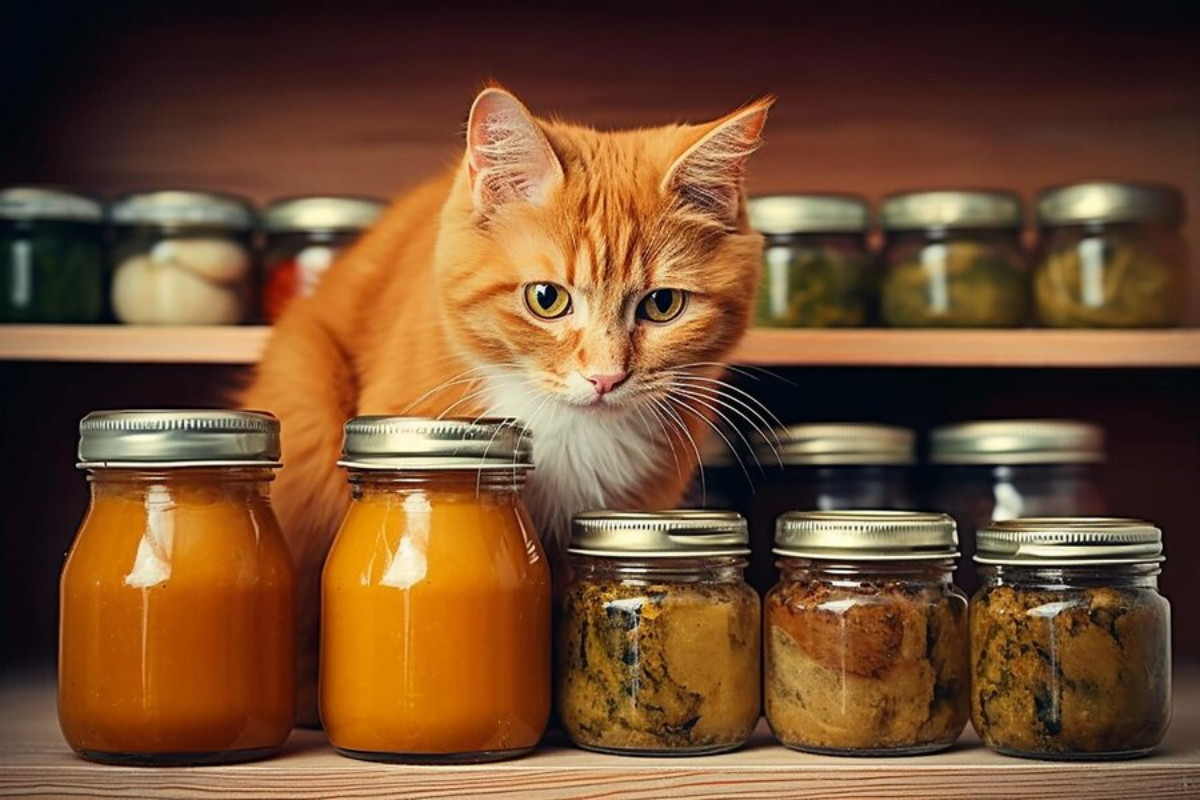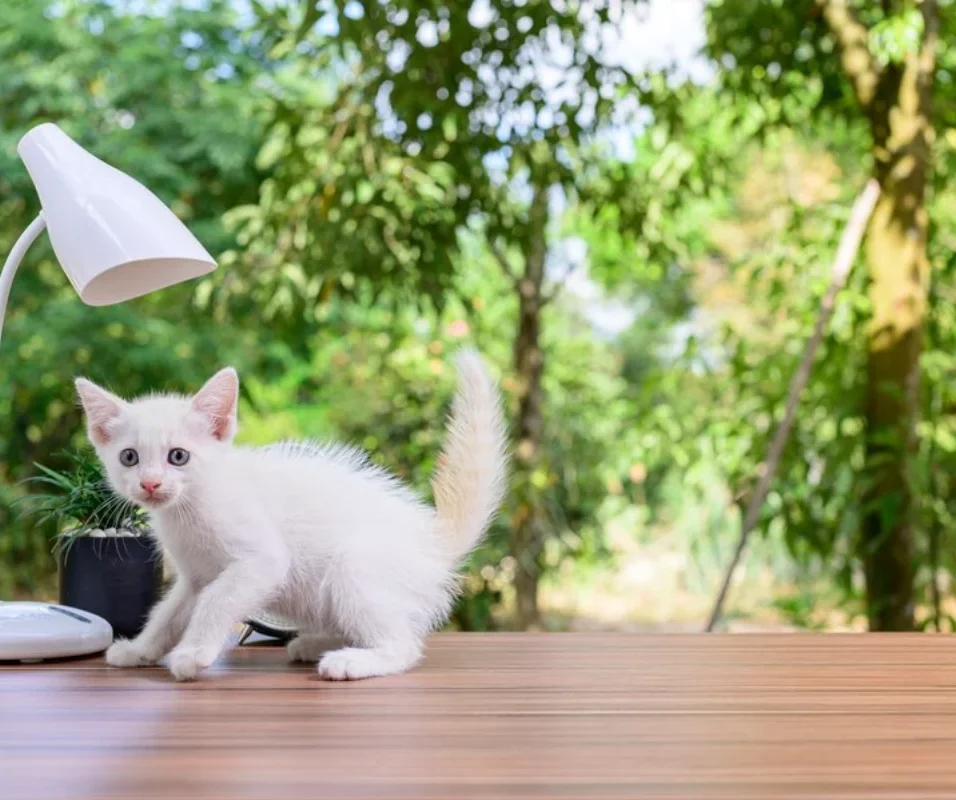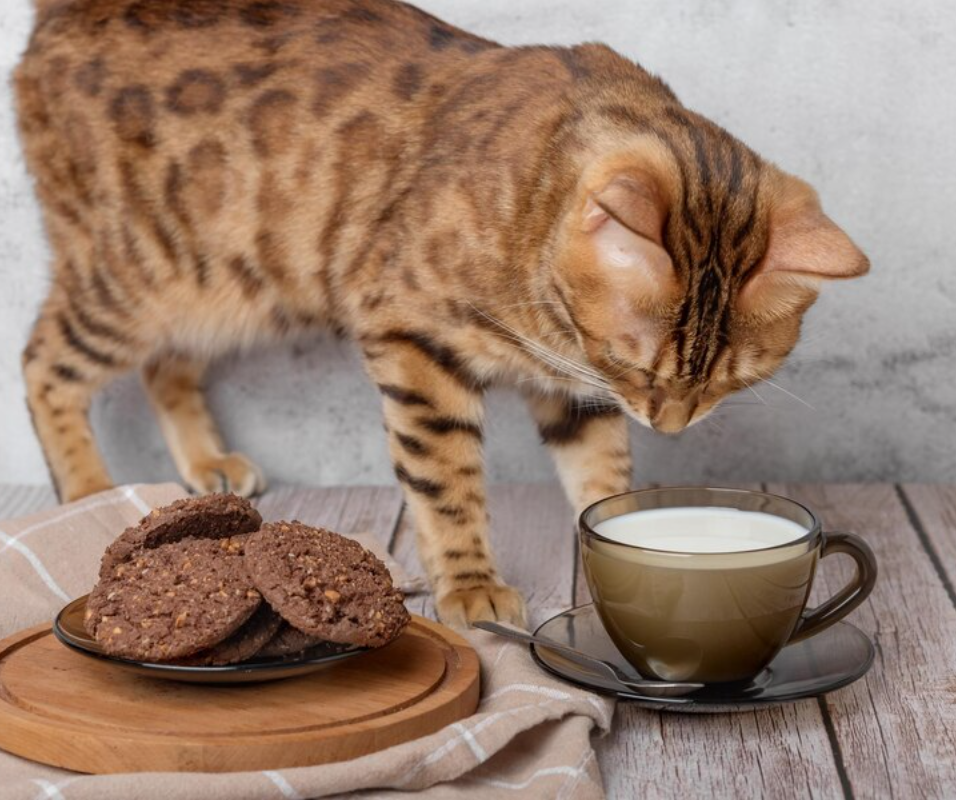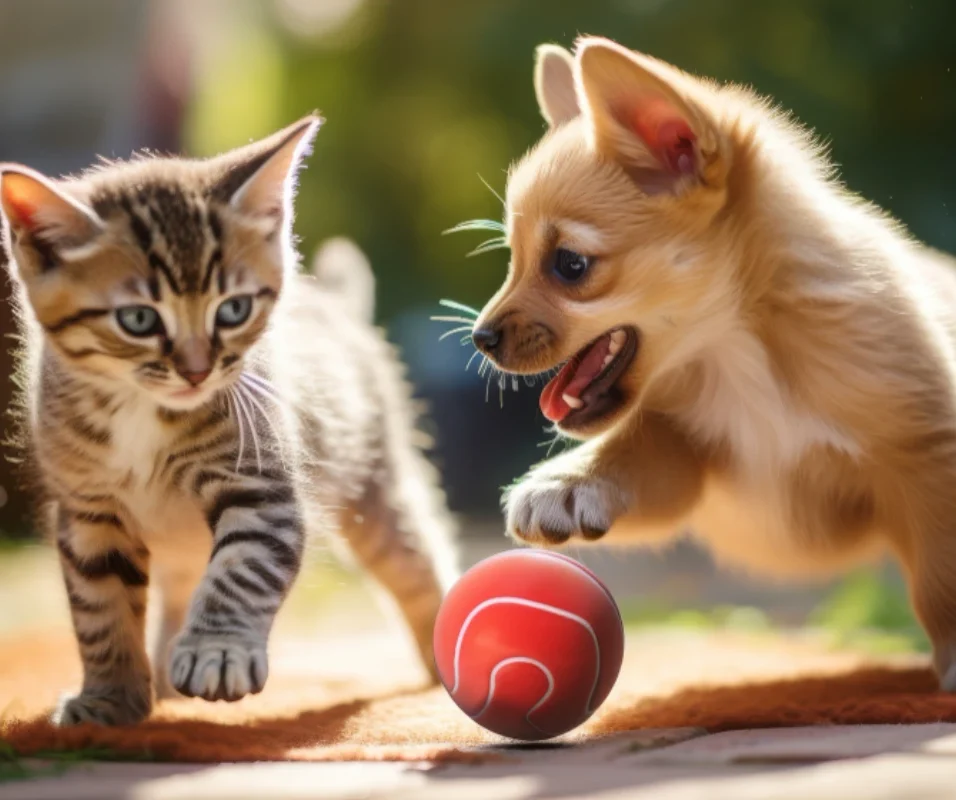“Have you ever thought that your cute little furry feline companion would enjoy tasting something of that golden sweetness loved by all of us?”
While honey has benefits to human beings as a health supplement, it is a completely different scenario for cats. For you to make the right decisions about what would be good and optimal for your cat’s diet, can cats eat honey? You have to be completely informed of its potential risks and benefits.hc
Well, here’s our blog investigating whether honey is safe for cats, what to look out for, and tips to keep your cat healthy. We talk through the pros and cons of feeding your cat honey, look at the nutritional value (or lack thereof), and answer some valuable questions such as:
- Is honey toxic to a cat?
- What do you do when your cat has ingested honey?
Hang around for some expert insights and tips on keeping your feline pal safe and sound.
Can Cats Eat Honey?
No, honey is not a good idea for cats. Honey is nontoxic but nutritionally worthless to cats and can indeed trigger digestive upset.
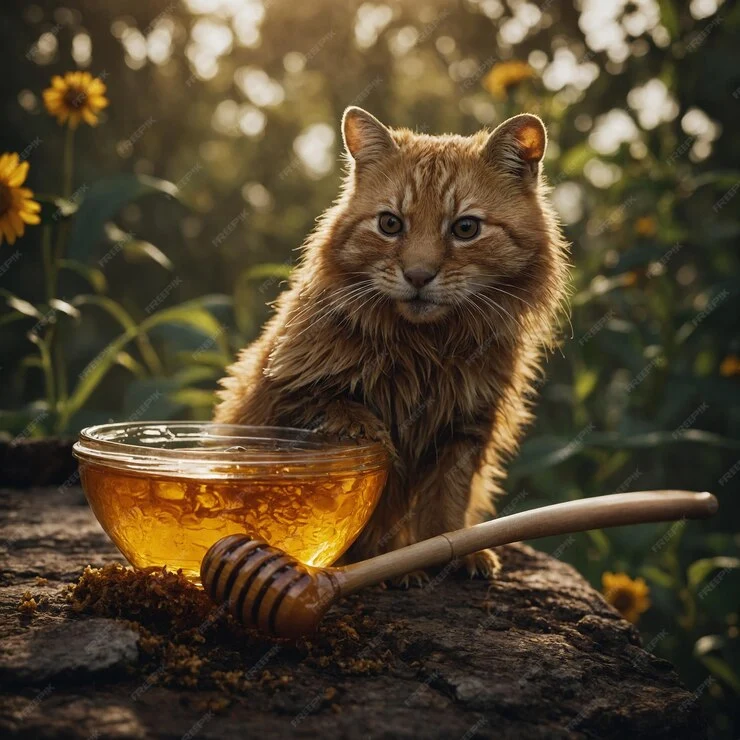
Although cats are obligate carnivores who don’t need any sugar in their diet and likely don’t care about it anyway. , they primarily eat meat as their main course of nutrition. They are in no way also known to require sugar-rich diets. Since honey is a sugar product, it may cause obesity, some level of digestive upset, and even diabetes if administered regularly.
Why Is Honey Not Ideal for Cats?
1. High Sugar Content
Honey is primarily 80% sugar. Cats lack the enzymes to digest sugars properly. This may lead to
- Weight gain
- Blood sugar spikes
- Long-term conditions such as diabetes
2. No Nutritional Benefits
Cats, as opposed to humans, do not derive any true health benefits from honey. Honey contains no protein, fats, or other essential vitamins for a cat’s diet. It is purely empty calories for them.
3. Risk of Botulism in Kittens
Honey contains the spores of the bacteria Clostridium botulinum which in turn proves lethal for kittens and more importantly causes severe health issues such as paralysis. Even in extreme cases, there may occur death.
What Happens If Your Cat Eats Honey?
If your cat accidentally swallows a small quantity of honey, don’t panic. While in adult cats, a teaspoon may not be very toxic, the following symptoms might appear:
- Diarrhea
- Vomiting
- Lethargy
- Loss of appetite
Tip:
Always ensure your cat has access to plenty of water to help flush out any potential toxins or sugars.
How Much Honey is Too Much?
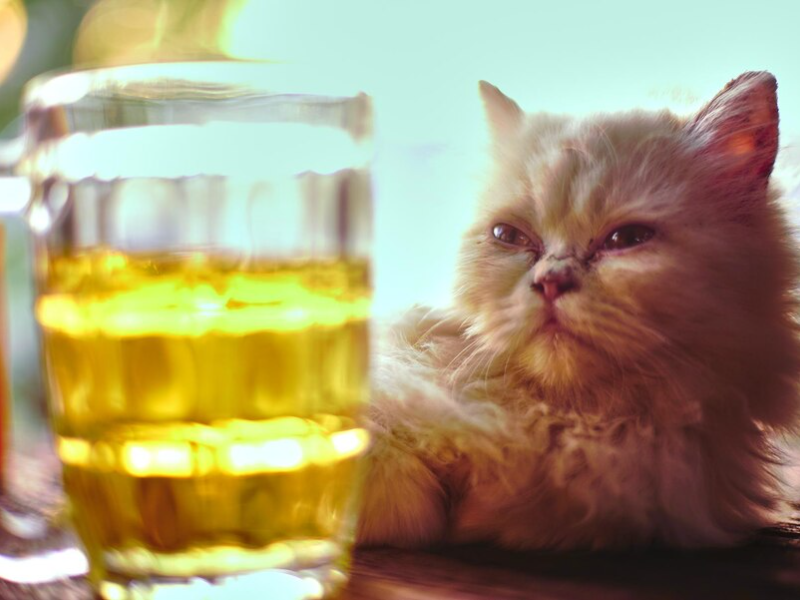
Though honey isn’t toxic to cats in general, it’s highly discouraged to feed your cat even a tiny amount of it regularly. Cats being obligate carnivores have their digestive systems geared towards meat, not towards sugary food like honey. Though a small lick or even a taste of honey on an infrequent occasion probably won’t harm your cat, feeding it regularly may cause some serious health issues.
1. Obesity
Even small quantities of honey hold a significant amount of sugar. A single tablespoon of honey has about 17 grams worth of sugar in it, which is quite high for a cat’s body to process. Since cats do not require sugar as a nutrient, frequent consumption of honey quickly results in fat gain due to obesity in the cats. Obesity in cats leads to:
- Diabetes
- Arthritis and mobility issues
- Heart Disease
2. Digestive Problems
There are no enzymes in the feline body to digest complex carbohydrates or sugars as in humans. Honey, being even a small amount, may pose gastrointestinal issues to a cat
- Vomiting and Diarrhea
- Stomach Ache
- Dehydration
3. Possible Danger to Kittens
Even for kittens, dangerous small amounts of honey exist. Honey could have spores from Clostridium botulinum that cause botulism, a very rare but life-threatening illness. Kittens as well as immunocompromised cats fall particularly in this risk, and hence honey is best avoided for those groups completely.
4. Effects on Blood Sugar Levels
Feeding your cat honey, specifically overfeeding with honey, can increase the blood sugar levels of your cat. The human body metabolizes sugar rapidly, cats metabolize glucose much more slowly.
5. Health Risks in the Long Run
Over time, feeding your cat honey, regardless of the amount, can lead to a variety of chronic diseases that include the following:
- Pancreatitis
- Dental Issues
Are There Any Benefits of Honey for Cats?
Although honey is full of antioxidants and has antibacterial effects, these benefits do not translate well to cats. Cats metabolize their food so very differently from humans and dogs. Potential benefits from honey are outweighed by the risks of digestive upset and overly high sugar intake.
Expert Opinion
Dr Jane Robertson, a veterinarian specializing in feline nutrition, explains
“Honey might have some health benefits for humans, but cats’ digestive systems aren’t designed to process sugars the way ours are. Even a small amount can lead to digestive issues or, over time, contribute to weight gain and other health problems.”
Should You Ever Feed Honey to a Cat?
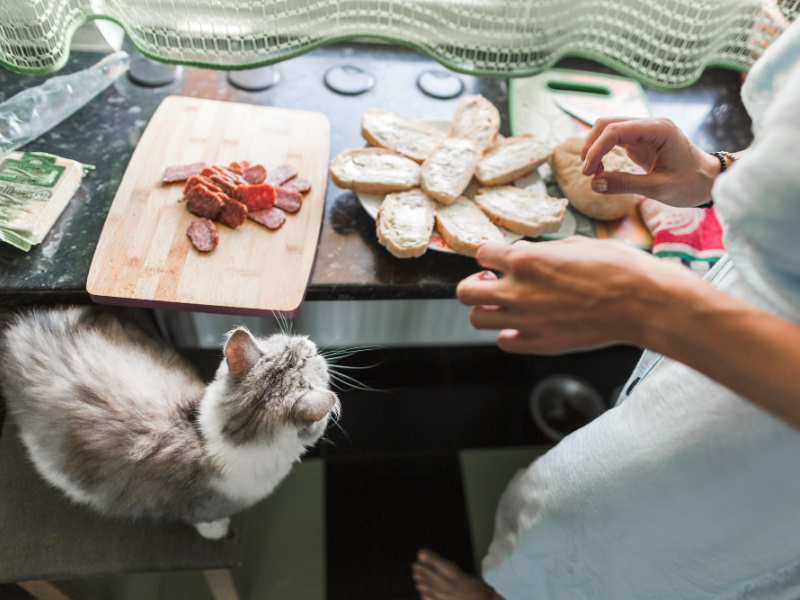
Generally speaking, honey should not be fed to a cat. Although honey does not harbour any type of toxicity toward cats, it does not provide the cat with anything nutritionally beneficial and can even contribute to potential health problems if fed regularly. Some important points to know:
1. Lack of Nutritional Value
Cats are obligate carnivores and require animal protein and fats to survive. Honey contains nothing but sugar, hence providing no valuable nutrition for the cats. Unlike humans who would appreciate the vitamins and antioxidants present in the honey, the cats do not benefit due to their specific requirements for diet.
2. Digestive Sensitivity
The digestive system of a cat is too sensitive to accept sweets which contain high sugar levels. Though you may feed honey to your cat once in a while, this may result in stomach disorders such as vomiting, diarrhoea, or swelling.
3. Hazard for Diabetic Cats
Honey is not to be accessed by diabetic cats because honey contains a high content of sugar that will cause severe elevations in blood glucose levels. It will thus be challenging to control the disease and even promote potential complications such as hyperglycemia in an animal.
4. Emergency Uses
Although honey is not supposed to be included in a cat’s regular diet, vets in some cases do prescribe an extremely small amount in very specific conditions if the cat might have a case of hypoglycemia, that is low blood sugar. In this situation, a small amount of honey would need to have a fast stream of sugar into the bloodstream.
5. Safer Alternatives for Treats
If you really want to give in to the treat to satisfy her cravings, you can give your cat a lot of healthier alternatives. High-protein, cat-friendly treats or small amounts of cooked chicken or fish are good options.
Valuable Tips to Maintain Your Cat’s Health
1. Feed it cat-specific foods
The best way to achieve your cat’s health in terms of good health is by offering quality, balanced cat food. A diet for cats consists of animal proteins and fats.
2. Be Aware of Disguised Sugars
Some cat treats contain added sugars which might cause a problem in the future. Make sure you read labels carefully and opt for natural ingredients for your cat treats.
3. Hydration
Be sure that your cat has access to fresh water at all times. This will regulate the metabolism of your cat and help in digestion if they ingest sugars.
Julie Willam, Pet Nutrition Expert
“Feeding your cat the right food is not just about giving them what they like, but about ensuring they thrive on a diet suited to their biology.”
Final Thought
Well, let’s cut to the chase, Honey is not toxic, but neither is it for cats. You would want to give your little fur ball a little spoonful of honey because honey contains so much sugar and little or no real nutritional value to speak of, it is not advisable for cats to consume it. If you want to treat your cat, opt for cat-specifically formulated treats to cater to the nutritional needs of the cat. Instead of honey being used as a human food, it may tend to cause some digestive upset in the cat and hence create long-term health issues.
Only specially prepared cat treats must be given to your cat. Honey and the sort of human food may upset your cat’s digestion and lead to long-term health problems. Is your cat curious about unusual foods? Has your cat ever been caught trying to nibble on something strange?



